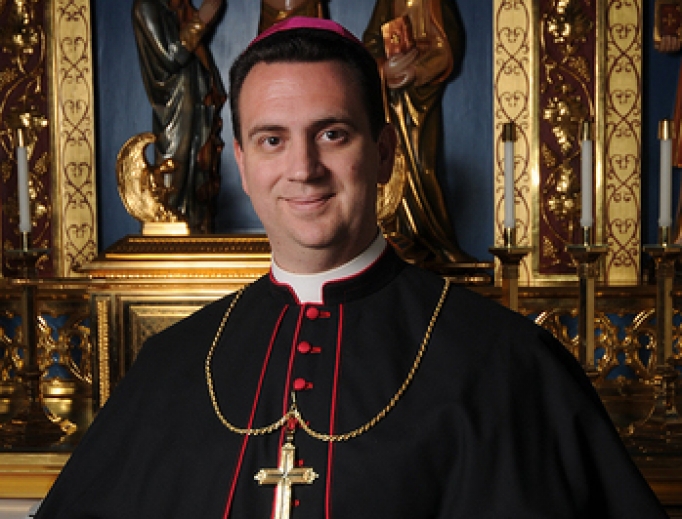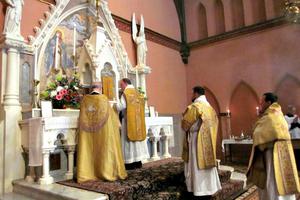Catholic Belief in Eucharist Helped by Fellowship, Beauty of Worship, says Ordinariate Bishop
Bishop Steven Lopes of the Ordinariate of the Chair of St. Peter told the Register that Catholics need more than catechesis: they need experiences of Jesus’s real presence in the Mass and through fellowship with the members of Christ’s body.

HOUSTON – What do Catholics need to believe that Jesus Christ is really present in the Holy Eucharist? While some say better catechesis is needed, the bishop of North America’s youngest diocese says Catholics need to experience the real presence of Jesus through worship and fellowship in the beauty of holiness.
Bishop Steven Lopes, a former official of the Congregation for the Doctrine of the Faith, leads the Ordinariate of the Chair of St. Peter, a Catholic diocese with Anglican traditions for North America created by Benedict XVI in 2012 under the apostolic constitution Anglicanorum coetibus. The Ordinariate has more than 40 Catholic parish communities throughout the U.S. and Canada, which emphasize both worship and fellowship in parish life as key to following Jesus Christ.
In this interview with the Register, Bishop Lopes discusses how the theology of fellowship draws from union with Jesus in the Holy Eucharist, brings Catholics deeper into the Eucharist, and gives vitality to Catholic discipleship and evangelization.
Bishop Lopes, Pew has come out with a new survey about Catholics and the Eucharist, whether the bread and wine actually become the body and blood of Jesus Christ. One of the interesting things about the survey is that it links Catholic belief in the Real Presence with regular weekly attendance at Mass. If they were not regularly at Mass, most Catholics think the Eucharist is a symbol. But is greater catechesis going to address the issue, if the people who need to hear it are not going in the first place? How do people understand what the Eucharist means for parish or church life?
I am sympathetic with the idea that we need better and more effective catechesis. I remember the catechesis before the publication of the Catechism of the Catholic Church and catechesis after the publication of the Catechism of the Catholic Church. So in other words, the resources are there, the catechesis is there. The catechesis today is in really much better shape. So there’s a “yes, but …” if you will, when I hear “well, we need better catechesis.” Well yes, but we can't make it an intellectual thing alone. Because God and Christ's gift of himself in the Eucharist is not an idea. It’s not an idea to be captured by the mind. It is a true self-gift. It is a personal gift of Christ to his Church, to the soul of the believer.
And therefore, as a personal gift, it has to be understood and received as a real person, which involves so many more aspects of the person rather than the mind. So worship – “the worship of God in the beauty of holiness,” as we say in the Psalms, has to involve the whole person. It has to capture all of the senses: sight, and smell and touch and even taste. That beauty in worship takes the faith in the real presence and makes it experienced; it makes it something that can be experienced. So the Ordinariate’s accent on beauty in worship — they all say we take worship very seriously and we do because it's a very serious thing — it is the appearance of God on Earth, and receiving the gift of Christ’s self-gift is a tremendous thing.
Now in the experience of many Catholics, once Mass is done, there's a general stampede out to the parking lot. Is that really the Church’s real vision for Catholic worship: we’ve had this individualistic experience of the Eucharist, so now it’s time for us all to get out of here?
It's the appropriation of a more Protestant “me and my Jesus thing” whereas the Catholic understanding has put equal accents on the seriousness of worship and the seriousness of fellowship. Again, another thing that's true about the Ordinariate is that there's a real emphasis on spending time together, not just getting to Mass and then going home. A lot of Ordinariate parishes will have a very serious fellowship, not just “here, there’s a cup of coffee in a Styrofoam thing,” but several of our parishes try to do lunch every Sunday. Several of our parishes do a really big reception after Evensong [Evening Prayer] or something like that. Because if what happens at Mass is that the Holy Spirit descends and is called down upon the altar to transform what it touches into the Body of Christ.
And that's true of the bread and wine: that through the operation and outpouring of the Holy Spirit, the bread and wine are transformed into the body of Christ. Well, that same Holy Spirit is called down upon the church and the Holy Spirit does, if you will, the same thing. It transforms that assemblage of people into the body of Christ. So it's the same action of grace that is transformative in the Eucharist, in Mass, where we start to recognize each other, not as strangers, not as individuals who have nothing to do with my life, but as members of the same body. Again, the Church isn't an idea. It is something that is brought about by the Holy Spirit in the self-giving of Christ to the Father in the Mass. This is what happens at Mass. And so to celebrate Mass means of course to reverently receive the Eucharist, but also reverently to receive your neighbor as members of the same body of the church. So the worship fellowship dynamic goes hand in hand.
So then parish fellowship after Mass is intimately connected with Holy Communion, with our Eucharistic worship?
Right. Absolutely. It flows from [the Eucharist], and then it leads back to. So [parish fellowship] flows from [the Eucharist] in that it's only in the Mass – because otherwise, otherwise church is just the gathering of like-minded individuals, who may or may not enjoy each other’s company. Well, that’s a sociological thing. That's the Elks Club. And we do that in the Church, but it’s called the Knights of Columbus or the St. Martha’s Guild or something like this. But no, this is deeper. This is more. This is actually the operation of grace in what God is doing. So fellowship begins by recognizing your fundamental identity as brothers and sisters in Christ through the operation of the Holy Spirit. And then that fellowship leads you back. So it begins in the Eucharist, and it leads you back to the Eucharist. Because once you're interacting with your brothers and sisters in Christ, you're going to be more aware of their needs, more aware of the human brokenness and relationships and what not. And then out of love for them, of course, when you go back to Mass, you’re bringing their prayers, their intentions and your concern for them. And then it informs your prayer; these are the things we pray for at Mass.
How then would you say that this experience of parish fellowship, following the Eucharist, relates to evangelization and the proposal of the Gospel?
Well, I think it relates very directly, honestly, to the largest driver of people who stopped going to church. We call it people who “leave the church.” Well, almost to my mind, to say that someone “leaves the church” involves an active intention. Most people just “stopped going.” For them, it's not ever like “I left the church” or “I stopped being Catholic.” And you might go to Mass on Christmas, or you might go to Mass on Easter, or to get your palm on Palm Sunday or something like this. But you’re not practicing your faith regularly. The biggest driver of that is the feeling of anonymity, the feeling of “that if it doesn't matter if I’m there, then it doesn't matter if I’m not there.”
As we look at this, of course, not being in church to hear the gospel or to be catechized, is a great way to lose contact with the faith, which seems to be what Pew is indicating. Now drawing on own experience and what you've seen happen in the Ordinariate, what are ways that parishes can maybe revitalize a theology of fellowship and gear it toward an evangelization that invites people back into the church?
I think the largest challenge in Catholic life across the board, outside of the Ordinariate, is simply the size of parishes. Ordinariate communities are smaller, but that's not just a circumstance, that's not happenstance. We would be intentional about that. The Ordinariate, even in places where we would have larger parishes like in Houston and Baltimore, well now we have three parishes in Houston and three parishes in Baltimore. Why? Because you need to manage that [size] somehow. And larger parishes have to be a lot more creative on how they form that sense of intentional community and intentional discipleship around the Mass. And parishes who have taken on that challenge directly through prayer groups, through social groups, through various initiatives of the parish, have reaped the benefits of it. They’re not experiencing the same kind of bleed as other parishes, mega-parishes are.
Is it because a person can say “I can see my identity here in this parish. I'm not an anonymous person?”
Exactly: “I am a member of this parish. And even just by my presence, it contributes something.”
You mentioned intentional discipleship. What is the relationship of fellowship then to discipleship?
I think it’s naive and perhaps overly clerical to think that it's going to be the priest who awakens in you the sense of where you can serve the community. That somehow volunteerism, that somehow participation in the life of the parish only happens if the pastor invites you to do something. That doesn't work. Where you learn not only what the needs are, but where your particular gifts and talents could be leveraged — that’s not quite the right word — but leveraged is in fellowship with your fellow Catholics. They're going to tell you; they're going to invite you, and because there's that sense of “we're all in this together.” That’s what intentional discipleship means: we're all in this together, and so therefore take responsibility with each other.
Because if you're waiting for the priest to ask you, you might be waiting a while. Because he's too stretched. In most places he's got 10,000 other things and 10,000 other people.
Where would you say clergy begin to empower their people to live this vision. Should they have a “catechesis of the coffee hour?”
That's a broad question and there's no one answer. I mean there’s thousands of initiatives, but also it just always can’t be the priest himself. There has to be other lay leadership in the parish, deacons and laypeople in the parish, who really kind of take responsibility and come up with initiatives. Because what's going to work for you — like a Theology on Tap, or catechesis between Masses or adult forum — what’s going work for you is going to drive me crazy. But this other thing over here is going to work for me. So it’s about understanding the variety of needs and addressing them in various ways. There’s not just one answer.
- Keywords:
- anglican tradition
- bishop steven lopes
- catechesis
- eucharist
- evangelization
- fellowship
- intentional discipleship
- ordinariate
- ordinariate catholic
- ordinariate of the chair of st. peter
- pew survey
- real presence
- theology
















